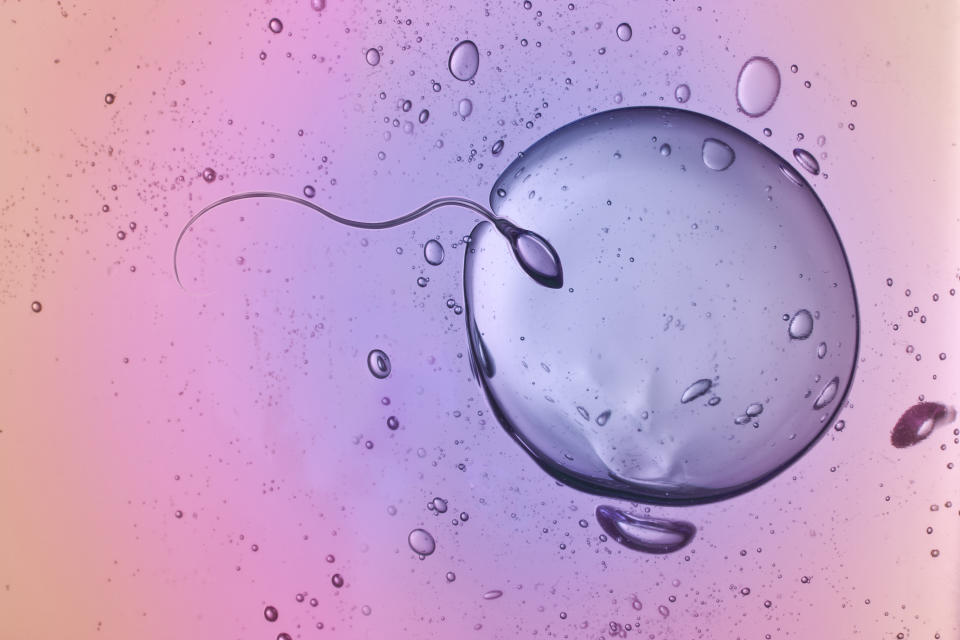Sperm donation after death should be allowed, advocates urge

Ethicists are urging for men in the UK to be allowed to donate their sperm after death.
A team from the University of Leicester and Wythenshawe Hospital in Mancester warn we are facing a sperm shortage, with the demand set to increase.
Providing the man gives permission before his passing, they argue it is “morally permissible” to allow the deceased’s swimmers to be given to those in need.
Not everyone is convinced, however, with one critic arguing it feels like a “step backwards” to recruit dead donors who will never meet their children.
READ MORE: Single mum, 39, who used sperm donor, explains choice to her baby boy
“It is morally acceptable that individuals can donate their tissues to relieve the suffering of others in ‘life enhancing transplants’ for diseases,” the ethicists wrote in the Journal of Medical Ethics.
“We see no reason this cannot be extended to other forms of suffering like infertility, which may or may not also be considered a disease.
“It is both feasible and morally permissible for men to volunteer their sperm to be donated to strangers after death in order to ensure sufficient quantities of sperm with desired qualities.”
Around 586 men become sperm donors every year in the UK, some of which intend to father just one child for the sake of a specific individual.
In 2016 alone, 924 IVF cycles were carried out with “donor egg and donor sperm”.
The Department of Health and Social Care estimates 4,000 sperm samples were flown in from the US, while 3,000 came from Denmark, not to mention others from the EU.
It worries Brexit may “worsen this state of affairs”.
READ MORE: Cheryl Tweedy is considering sperm donation - how does it work?
“Clearly there is high demand for donor sperm and reports demonstrate this is increasing”, the ethicists wrote.
Sperm donation currently involves “counselling and intimate discussions”, as well as “travel to clinic to make donations weekly for three-to-six months”.
In the UK, it is illegal to pay donors “more than reasonable expenses”, which generally work out at up to £35 ($44.80) per clinic visit, according to the Human Fertilisation & Embryology Authority.
Posthumous supplies would avoid this “cumbersome” procedure, while still allowing donors the satisfaction of knowing they are helping others or passing on their genetic material, the ethicists argue.
If signed off, sperm donation would be collected via electrical stimulation of the prostate gland, leading to ejaculation.
The scrotum could also be surgically cut to access the tubes that carry sperm from the testicles.
Once extracted, swimmers can be frozen until needed.
READ MORE: Freezing your eggs: cost, process and everything else you need to know
Evidence suggests sperm harvested from corpses can lead to healthy pregnancies and children, even if collected 48 hours after death.
Check-ups on the donor and his sperm sample could look for any “unhealthy” genes that may be passed on, the ethicists claim.
If the family of the deceased objected, they could “veto” his sperm being used.
Yet, some may take comfort from knowing their loved one “lives on”, similarly to them taking “solace” in the knowledge his other organs have been given to those in need, the ethicists claim.
“The important point is considerations of the family, including a romantic partner surviving the deceased man, do not justify a blanket ban on the use of sperm collected after death, especially if the donor has specified a desire to donate,” they wrote.
The team note there are concerns over the “status” of the child, as well as donor anonymity.
It is also unclear who would pay for the harvesting of the sperm.
While the argument for deceased sperm donors may sound compelling, not everyone is on board.
“This is a very well argued paper but one I find myself strongly disagreeing with,” Professor Allan Pacey, from the University of Sheffield, said.
“Given the distance we have travelled in terms of recruiting donors who are willing to be identified to donor conceived people, it feels like a backward step to then recruit donors who are dead and therefore they will never have the opportunity to meet.
“The practicalities of posthumous sperm extraction and its use does not concern me, as these are fairly routine techniques. But I do feel very uncomfortable with the idea.
“I’d much rather that we invested our energy in trying to recruit younger, healthy, willing donors who stand a good chance of being alive when the donor conceived person starts to become curious about them, and would have the opportunity to make contact with them without the aid of a spiritualist.”

